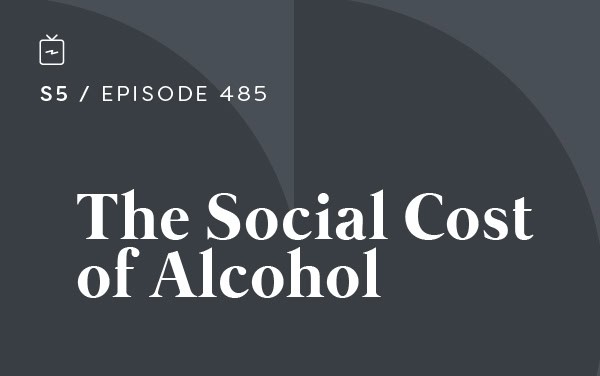
by Kris Oyen | Jun 3, 2024 | Podcast
Podcast: Play in new window | Download
Subscribe to the Recovery Elevator Podcast Apple Podcasts | | More
Episode 485 – The Social Cost of Alcohol
Today we have Jennifer. She is 41 from Hamilton, OT Canada and took her last drink on January 18th, 2024.
Recovery Elevator is going to Vietnam January 9th-20th, 2025. Registration for our newest alcohol-free travel trip opens July 1st.
Better Help: www.betterhelp.com/elevator – 10% off your first month. #sponsored
[02:09] Thoughts from Paul:
Paul shares some information from an article he saw on the Instagram page recoveryroadmap.me. It discusses how in Canada, despite bringing in $13 billion in tax revenue, the net social costs in 2020 was $19 billion. And it is even worse in the US.
The bright side of all of this is that we are becoming aware of this major deficit, and change is taking place. The demand for alcohol is lowering as people are becoming more aware that alcohol is not good for you. Two years ago, The Huberman Lab did a podcast called What Alcohol Does to Your Body and he debunked the myth that alcohol is good for you.
Paul also shares that thanks to an initiative called Sounds Right, musicians who use natural sounds can list “Nature” as a featured artist and royalties from the tracks will go toward environmental causes.
Exact Nature: https://exactnature.com/RE20
[08:33] Paul introduces Jennifer:
Jennifer is married and they have a daughter and a standard poodle. She works for the family business and for fun she plays paintball, tennis and volleyball – anything active with friends.
Jennifer says that as the “good girl” growing up, she always wanted to be bad and says that drinking fit in with that. During the week she was excelling in school, but on the weekends, she went to raves with friends and started smoking weed. She enjoyed the duality of her life and the same pattern continued at university.
While in her first year of college, her father bought back his company with a ten-year plan of Jennifer becoming the CEO. The stress and responsibility of this and her parents divorce a few years later all found her drinking escalating. Some of her friends told Jennifer’s mom about her drinking and staged a small intervention to which Jennifer was not receptive. She assured everyone she was ok, but then just began to isolate when she drank.
After the plan found her becoming the CEO, her drinking went from nights and weekends to drinking all day just to cope. She recognized that this was a problem but was scared to mention it to anyone. This is when she first joined Café RE, started listening to podcasts and trying to learn more about the disease. Jennifer tried a lot of moderation methods but was never successful until she got pregnant with her daughter at 35. She was able to quit drinking while pregnant and a few months after having the baby.
After returning to work, Jennifer says her drinking started right where she left off. She says she was beginning to have disturbing thoughts and finally concluded that she needed help. Not being able to come up with a good way to quit without anyone knowing, she decided to confide in her cousin who she knew would understand.
In January of 2024 at a dinner with her cousin, mom and husband, Jennifer was able to burn the ships, and everyone was very supportive. Upon going to treatment shortly after, Jennifer says she took her recovery very seriously and wanted to make it worth her time.
Journaling and practicing mindfulness are big parts of Jennifer’s recovery, she takes time to be present with her daughter and her life, attends meetings and counseling regularly and says stacking habits are important to her growth. Nurturing the sober version of herself has been great for her. Jennifer can see a future now
Jennifer’s best sober moment: Walking my daughter to school and being present.
Jennnifer’s parting piece of guidance: Don’t be afraid to ask for help.
Café RE – promo code OPPORTUNITY waives set up fee.
RE merch
Instagram
Recovery Elevator YouTube
Sobriety Tracker iTunes
Recovery Elevator
It all starts from the inside out.
I love you guys.
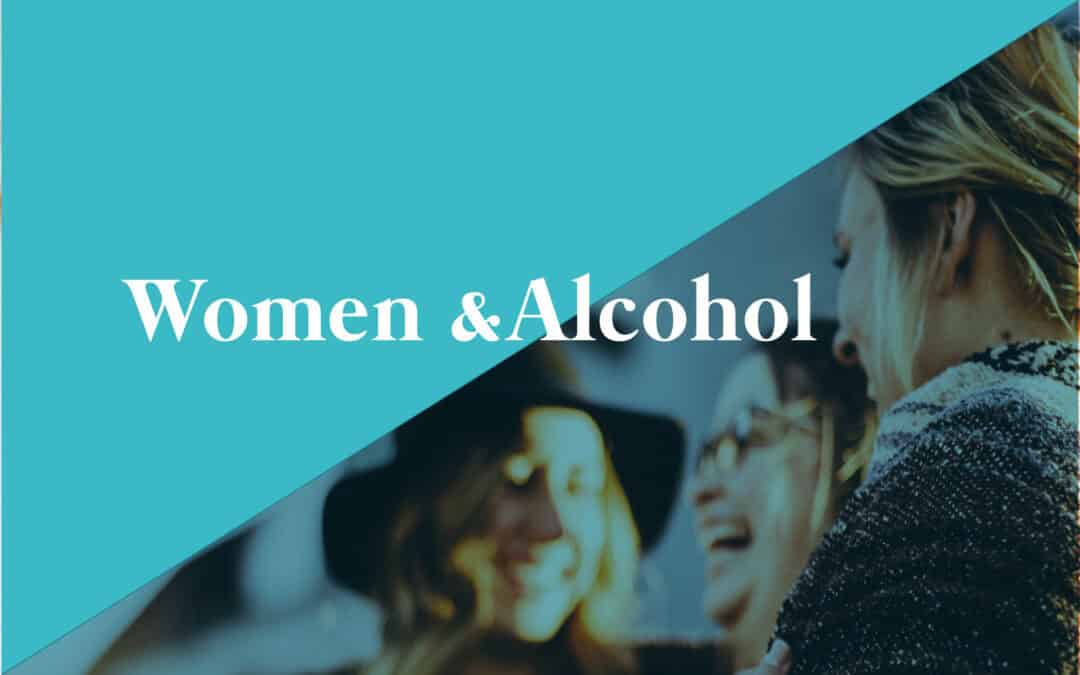
by RE Helper | Feb 15, 2024 | Alcohol Free, Blog, Early Sobriety, Resources, Womens health
Today’s blog entry is from Alisa. Alisa has been a member of Café RE since July 2023. She recently took part in our Recovery Elevator REstore 2024 course. She is an active and supportive member of her Café RE GO group!
Women and Alcohol
By: Alisa (Café RE GO)
I’d heard the anecdote that women had started to surpass men with their drinking habits. Then in 2023, the WHO announced that no amount of alcohol was safe for consumption. This was all lining up with what Holly Whitaker said in her book Quit Like A Woman. So I sought to dig into this and better understand what was behind these trends in women’s drinking.
The history of women and alcohol is an interesting one.
It zigzagged from a movement to ban alcohol (predominantly to stop men from plundering the family savings at the bar) to the pursuit of a seat at the bar. Ironically, Prohibition gave rise to secret bars (speakeasies). Where women were able to redefine long standing gender roles by smoking, drinking, and having fun in public. Though women had imbibed before this time, they had rarely done so in public because as you can imagine, most drinking establishments were male-only. “So for young women, speakeasies stirred a spirit of rebellion”.
In order to understand what happened to the alcohol industry, it’s useful to examine what happened with cigarettes.
Big Tobacco used several strategies to advertise to women. For example, the industry prompted a feminine ideal of thinness presenting the cigarette as a way to achieve this ideal. They taught Hollywood actors how to smoke in films to make smoking look sophisticated. They also hired a PR giant. The PR giant then hired women to smoke in a parade to manufacture a connection between smoking and liberation. He coined the term “Torches of Freedom” to encourage women to smoke as a symbol of emancipation and an act of challenging social taboos.
Big Alcohol* rode in on the coattails of the tobacco industry.
They used similar tactics to market alcohol to women by appealing to their thirst for equality and independence. By making tobacco products custom fit to women (think Virginia Slims) and hiring women to smoke while engaging in the women’s liberation activities, they spread the idea of smoking as empowerment. Similarly, the alcohol industry created pink drinks, colorful labels, overpowering fruit flavors, and low-calorie options to target women by capitalizing on gender stereotypes. I find these strategies incredibly ironic since initially the alcohol industry used women’s bodies (and implicitly the promise of sex) to sell alcohol to men.
The advent of social media made things even easier for Big Alcohol
The advent of social media made things even easier for Big Alcohol as algorithms specifically targeted individual demographics. Now we receive customized ad feeds based on our past behaviors. Us social media users also became their advertisers by spreading trends like “Rose All Day.” Culturally, alcohol (and especially wine) became a symbol of stressed-out women and moms with memes featuring “Mommy juice.”
Sadly, these common marketing messages exploit women’s desire for friendship, relaxation, and empowerment. Having a glass of wine has become a way that women and moms feel like they are taking care of themselves. As Sarah Hepola put it in her drinking memoir Blackout, “Wine and confession. Wine and sisterhood. Wine had become our social glue, the mechanism of our bonding. We needed the wine to shut out the jackhammers of our own perfectionism and unlock the secrets we kept within”.
While many of us use alcohol as a social lubricant, we may also use it to “unwind” in private.
While many of us use alcohol as a social lubricant, we may also use it to “unwind” in private. Concepts like ‘Wine o’clock’ offered permission to drink when we felt like it and linked alcohol to a method for navigating daily life stress. Absolutely none of us are to be blamed for falling for this and using alcohol in these ways. As the addiction and trauma specialist Gabor Mate says, alcohol use is a response to pain and suffering. Alcohol has long been a culturally accepted and condoned way of dealing with stress. In fact, alcohol marketing to both women and men ramped up during one of the most stressful global times in recent history: the pandemic. Here is an example of a marketing slogan by Retail Drinks Australia:
“If we want people to stay at home, if we want them in a good state of mental health with a conviviality that encourages them to adhere to social isolation, we’ve got to ensure they have access to the social norms such as enjoying a drink.” Danica Keric and Julia Stafford from the Cancer Council Western Australia’s Alcohol Programs Team said in response, “There was a deliberate move by the alcohol industry to frame alcohol as an essential product including for our mental health, during the pandemic”.
If you’re not appalled by now at how the alcohol industry operates, consider how the same things are happening with our food supply.
Like alcohol and cancer, the food industry plays a significant role in the metabolic disease rates in our country by lacing food with addictive chemicals like sugar and then obscuring the dangers of these additives. “The system works. Not for the best interests of health but for the best interests of those who are profiting off the system” Michael Greger, author of How Not To Die.
My favorite Quit Lit writer and recovery program pioneer, Holly Whitaker, summarizes:
“We read labels, we shun gluten, dairy, processed foods, and refined sugars. We buy organic, we use natural sunscreen and beauty products. We worry about fluoride in our water, smog in our air, hydrogenated oils in our food, and we debate whether plastic bottles are safe to drink from.
We replace toxic cleaning products with Mrs. Myers and homemade vinegar concoctions. We do yoga, we run, we SoulCycle and Fitbit, we go paleo and keto, we juice, we cleanse. We do coffee enemas and steam our yonis, and drink clay and charcoal, and shoot up vitamins, and sit in infrared foil boxes, and hire naturopaths, and shamans, and functional doctors, and we take nootropics and we stress about our telomeres. These are all real words.
We are hyper-vigilant about everything we put into our body, everything we do to our body, and we are proud of this. We Instagram how proud we are of this, and we follow Goop and Well+Good, and we drop 40 bucks on an exercise class because there are healing crystals on the floor.
The global wellness economy is estimated to be worth $4 trillion. $4 TRILLION DOLLARS. We are on an endless and expensive quest for wellness and vitality and youth. And we drink fucking rocket fuel”.
While women started off forbidden from drinking in public, women are now drinking as much as men if not more. But what most women don’t know is that our rates of addiction and alcohol-related deaths are surpassing theirs. It turns out that due to our physiology, women start to have alcohol-related problems sooner and at lower consumption rates than our male counterparts. This occurs because of how we process alcohol. Because we have lower total body water content, blood alcohol levels are higher. The first stage of alcohol metabolism is slowed which results in more alcohol being absorbed into the bloodstream. Unfortunately, this leads to greater generation of liver-toxic products like acetaldehyde. Thus, imbibing alcohol increases the vulnerability of women to the risk of alcohol-related illnesses such as liver disease and cancer.
In my fantasy worldview, everyone is ethical and people who have the authority to powerfully impact public health make the “right” (aka moral) decisions. Sadly, this isn’t true. The way we can take our power back is to know the truth and make decisions based on these facts. When I started treating sobriety as an act of rebellion, something new clicked for me. I hope it can for you too.
*Big Alcohol refers to the lobbying front group for twelve of the largest multinational alcohol corporations.
**More from Recovery Elevator referencing Big Alcohol**
RE Podcast Episode 407
Blog – A Messgage to Big Alcohol
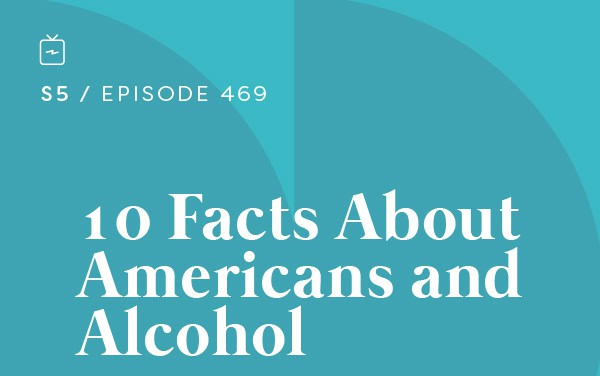
by Kris Oyen | Feb 12, 2024 | Podcast
Podcast: Play in new window | Download
Subscribe to the Recovery Elevator Podcast Apple Podcasts | | More
Episode 469 – 10 Facts About Americans and Alcohol
Today we have Lisa. She is 66 years old and lives in Atlanta, GA. She took her last drink on November 16th, 2022.
Café RE – use the code OPPORTUNITY to waive the setup fee.
[02:51] Thoughts from Paul:
Paul shares with us ten facts about Americans and their drinking habits that he found in an article from the Pew Research Center.
The article shares with us statistics regarding what people are drinking and where alcohol consumption is the highest, along with statistics about age and income ranges.
The biggest takeaway from this article is the first stat that says, “Only 62% of U.S. adults say they drink” while 38% abstain completely. Not everyone is kung fu fighting. There is a voice inside the head that says, “Everybody drinks”, but right there we just debunked that myth. A lot of people don’t drink because they don’t want to. Many people don’t drink because their forced to. Whatever the reason is, about 40% of Americans don’t drink.
And although alcohol consumption is rising, we’re seeing the younger generations say no, like no previous generation has done so.
Check out Sober Link. You can find some tips and can sign up for a $50 off promo code.
[10:00] Paul introduces Lisa:
Lisa is a repeat guest from episode 411. She took her last drink on November 16th, 2022. She is 66 and lives outside of Atlanta. She has been married for 37 years and they have two adult children. Lisa enjoys working out, traveling, reading, and listening to podcasts.
Lisa grew up in a close family, but her parents had a miserable marriage. Her mother drank to deal with it and the drinking increased when Lisa was in middle school. Upon trying her first drink in high school, she didn’t have the “wow” moment at first but quickly found it gave her confidence and she felt accepted and less insecure with her friends.
After graduating college and entering the booming computer software industry, Lisa found herself drinking at a lot of parties, conferences, and sales meetings. She says her husband didn’t drink much. Aside from when she was pregnant, Lisa drank in a way that she considered normal.
In her 40’s, Lisa and her husband left the corporate world and started their own business. It was successful but very stressful. She says her drinking ramped up and she was beginning to try and hide the wine bottles from her husband.
After a fall Lisa had during a blackout, her doctor referred her to a counselor. She discovered AA and was able to stay sober for a year without doing the work. Soon after the year mark, Lisa thought she could moderate and started drinking again. She was successful with moderation at first, but after retiring, finding herself as the sole caretaker for her elderly mother, the drinking increased again.
One night Lisa found herself pouring a glass of wine that she really didn’t want and it was then she decided enough was enough. This time Lisa decided to get help. She went to AA and didn’t feel it was working for her. She discovered a Facebook group called SoberSis as well as Café RE. After her last interview, she was connected with a lot of other ladies that she is still connected with today.
Last year found Lisa tending to several health scares, several surgeries, and the unexpected loss of her parents eight weeks apart. Lisa says that gratitude, using the tools she has learned in the sober community as well as her faith and family has helped her remain sober through it all.
Lisa’s favorite ways to relax deep breathing and exercise.
Lisa’s advice for somebody struggling with life and alcohol: find a way to connect no matter how uncomfortable it is, we have to have connections.
Café RE – use the code OPPORTUNITY to waive the setup fee.
Instagram
Recovery Elevator YouTube
Sobriety Tracker iTunes
Recovery Elevator
Go big, because eventually we’ll all go home.
I love you guys.
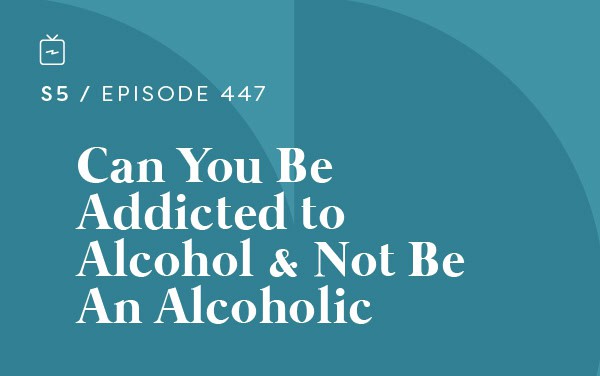
by Kris Oyen | Sep 11, 2023 | Podcast
https://traffic.libsyn.com/secure/recoveryelevator/RE_447_mixdown.mp3Podcast: Play in new window | DownloadSubscribe to the Recovery Elevator Podcast Apple Podcasts | RSS | More Episode 447 – Can You Be Addicted to Alcohol and Not Be An Alcoholic? Today we have...
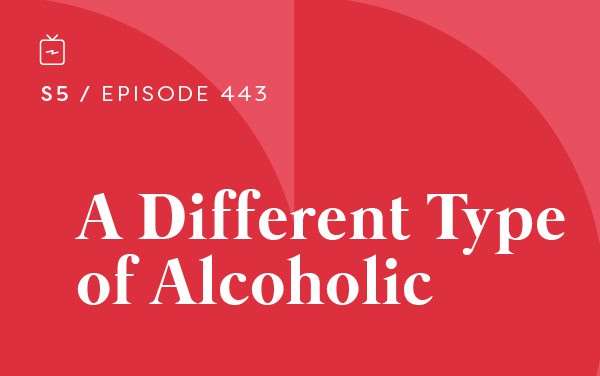
by Kris Oyen | Aug 14, 2023 | Podcast
Podcast: Play in new window | Download
Subscribe to the Recovery Elevator Podcast Apple Podcasts | | More
Episode 443 – A Different Type of Alcoholic
Today we have Kelly, she is 46 from Minneapolis, MN and took her last drink on June 18th, 2023.
Join us Saturday August 26th in Boston, MA for a day of service in collaboration with The Phoenix. Learn more about the event here.
Check out our sponsor Go Brewing. Use the code ELEVATOR for 15% off.
[02:57] Highlights from Paul:
When saying the word “alcoholic”, these images, and thoughts commonly come to mind:
Living under a Bridge. Brown paper bag. Homeless. Hopeless. Unemployed.
Some of this is accurate but studies show only 5% of alcoholics fit these descriptions.
The other 95% are high functioning, tend to be high earners, more educated, are healthier and have more stable relationships than average.
With the estimated 452 million alcoholics that don’t fit the stereotypical description of an alcoholic, this takes the saying you are not alone to a new level.
We justify or benchmark our drinking according to what an alcoholic looks like. I’m not that bad, I have a job, and money in the bank. We surround ourselves with other drinkers who don’t fit the alcoholic stereotype to solidify our own positions on the addiction scale. Now a classic trait of an addiction is that we are blind to where we actually are with the addiction process. The hole you find yourself in is probably deeper than you think. My recommendation is to stop digging. You CAN put the shovel down. Another classic trait of an addiction is the progression. We have 452 million alcoholics on the globe who are not living under a bridge or drinking out of brown paper bag yet.
Better Help: www.betterhelp.com/elevator – 10% off your first month. #sponsored
[09:30] Paul introduces Kelly:
Kelly took her last drink on June 18th, 2023, and has 6 days at the time of this recording. She is 46 and lives in Minneapolis. She leads software development teams for a living. Kelly loves the outdoors and enjoys running, hiking, and paddleboarding. She enjoys movies, music, and museums as well.
Kelly first tried alcohol at a party in 9th grade. Drinking was not something that she wanted to do but she succumbed to peer pressure. A year later she started spending time visiting her brother at college, and she enjoyed hanging out with him and his friends and started drinking more frequently. It was a good escape from the abuse she was dealing with at home.
In college Kelly was drinking and dealing with an eating disorder. She worked hard to overcome her bulimia but then her drinking ramped up after that. After college she married a fellow engineer, and they would drink heavily together. After they started having children and settling down, her husband was able to quit the excessive drinking, but Kelly was not.
While raising her children, Kelly was able to cut back on drinking and started putting rules around it. Her relationship wasn’t going well, and Kelly was going out more frequently and drinking almost daily. After a few drinking and driving charges, Kelly began to realize that she could no longer control it. Over time she recognized that she was starting to isolate more and then would go out to bars to find connection with other people.
Kelly has been able to have more gaps in drinking days over time and has been acquiring tools throughout the process. She is recognizing that she needs to treat her sobriety like a baby and nurture it daily. Each morning she meditates and uses the Reframe app. She attends AA meetings frequently and has recently found a therapist to help her with her childhood trauma.
Kelly’s plan for recovery moving forward: keep doing things that make her feel uncomfortable, attending more meetings, and new meditation practices.
Kelly’s parting piece of guidance: keep trying, be open to new resources.
Cafe RE Use the promo code OPPORTUNITY to waive the set-up fee.
Recovery Elevator YouTube
Sobriety Tracker iTunes
Recovery Elevator
Go big, because eventually we’ll all go home.
I love you guys.







